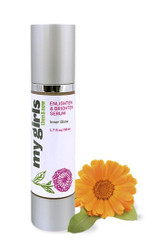My Go-to Vitamin C Facial Serum
Posted by Kathy P. on Jan 17th 2025
The Power of Vitamin C for Skin Recovery During Chemotherapy
Chemotherapy is a life-saving treatment for many cancer patients, but it often comes with a range of side effects, particularly affecting the skin. From dryness and irritation to increased sensitivity, chemotherapy can take a toll on the skin, leaving patients searching for ways to soothe and repair their compromised skin. One natural and effective solution that has been shown to offer multiple benefits is Vitamin C. Here’s why Vitamin C is a crucial ally for those undergoing chemotherapy treatments.
1. Promotes Collagen Production
Collagen is a structural protein that helps maintain the skin’s elasticity and strength. Chemotherapy can sometimes impair the skin's ability to produce collagen, leading to sagging, dullness, and reduced healing capacity. Vitamin C plays a critical role in collagen synthesis, helping to support the skin’s structural integrity. By stimulating collagen production, Vitamin C can aid in promoting healthier, firmer, and more resilient skin, which is especially important during chemotherapy.
2. Fights Free Radical Damage
Chemotherapy works by attacking fast-growing cells, but this process also generates a significant amount of free radicals—unstable molecules that can damage healthy cells, including skin cells. Free radicals contribute to premature aging and skin damage. Vitamin C is a potent antioxidant, helping neutralize these free radicals and protect skin cells from oxidative stress. This not only helps prevent further damage but can also promote skin recovery and reduce inflammation.
3. Reduces Redness and Inflammation
One of the common side effects of chemotherapy is inflammation, which can lead to redness, puffiness, and irritation. Vitamin C has natural anti-inflammatory properties that can help reduce this discomfort. By calming irritated skin and soothing inflammation, Vitamin C can make the skin feel more comfortable and less sensitive, providing much-needed relief during treatment.
4. Boosts Skin Hydration
Chemotherapy often leads to dry, flaky skin, which can make existing conditions worse. Vitamin C helps improve the skin's ability to retain moisture by supporting the skin’s natural barrier. It enhances hydration, making the skin feel softer and more nourished. Additionally, Vitamin C can increase the absorption of other beneficial ingredients found in moisturizers and serums, improving overall skin hydration.
5. Accelerates Skin Healing and Repair
Chemotherapy can slow down the skin’s ability to heal, leaving it vulnerable to cuts, rashes, or other forms of damage. Vitamin C is essential for wound healing and tissue repair. Its role in collagen production and its antioxidant properties help repair damaged skin cells and encourage faster regeneration. For patients dealing with skin changes or irritation during chemotherapy, Vitamin C can speed up the healing process and reduce the appearance of scars or lesions.
6. Brightens and Evens Out Skin Tone
A common side effect of chemotherapy is uneven skin tone, including dark spots or hyperpigmentation. Vitamin C is known for its ability to brighten the skin and reduce the appearance of pigmentation. By inhibiting melanin production, Vitamin C can help fade dark spots, even out the complexion, and restore a healthy glow. This can be particularly beneficial for those experiencing post-treatment pigmentation changes.
7. Enhances Skin's Natural Defenses
Chemotherapy weakens the body’s immune system, leaving the skin more vulnerable to infections and environmental stressors. Vitamin C helps boost the skin’s natural defenses by strengthening its protective barrier. This is crucial for preventing further skin damage, particularly for patients with compromised immune systems. A stronger skin barrier means fewer chances of irritation and fewer breakouts, allowing the skin to stay calm and protected.
How to Incorporate Vitamin C Into Your Skincare Routine
If you’re undergoing chemotherapy and want to reap the skin benefits of Vitamin C, here are a few ways to incorporate it into your routine:
- Serums: Vitamin C serums are one of the most effective ways to deliver a high concentration of Vitamin C directly to the skin. Look for serums that contain stabilized forms of Vitamin C like ascorbic acid or sodium ascorbyl phosphate.
- Moisturizers: Many moisturizers now contain Vitamin C, which can help hydrate and repair the skin while offering antioxidant protection. These can be particularly helpful for combating dry skin caused by chemotherapy.
- Cleansers: Gentle Vitamin C-infused cleansers can be used to refresh and nourish the skin without stripping it of moisture, an essential step during treatment.
- Face Masks: For an extra boost of Vitamin C, you can try using a Vitamin C face mask once or twice a week. This can help brighten and hydrate the skin, providing relief from the stress of chemotherapy.
Vitamin C is a Powerhouse Ingredient with Benefits for Skin Side Effects of Chemotherapy Treatments
Vitamin C is a powerhouse ingredient that offers multiple benefits for the skin, especially for those undergoing chemotherapy. It helps to support collagen production, fight free radicals, reduce inflammation, boost hydration, and speed up the healing process. Incorporating Vitamin C into your skincare routine can be an excellent way to protect and rejuvenate your skin during this challenging time. However, always consult with your oncologist or dermatologist before introducing any new products, especially if you’re dealing with sensitive or damaged skin. With the right care and the support of powerful nutrients like Vitamin C, it’s possible to maintain healthier, more resilient skin throughout chemotherapy.
Customer Testimonial
"My Girls Vitamin C Enlighten and Brighten Serum is my go-to for facial skincare. I have tried numerous serums and this is by far my favorite!!! Perfect first layer before I do primer and then my makeup. My skin feels and looks better than it has in years!" Kathy P.
Learn more here


